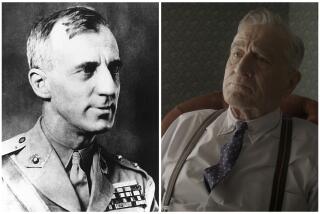What inspired the new ‘Borat’ movie? Just the fight for the soul of America
There are about a hundred or so rock-solid reasons not to attempt a sequel to “Borat” 14 years after the original. High up on the list comes the fact that comedy sequels, with few exceptions, usually disappoint. So why even risk destroying the legacy of a beloved character for a sequel that can’t possibly stand up to the first movie?
This question will haunt the next two years of our lives, but it will also spur us on to make the best movie that we humanly can. Or at least the most difficult to achieve. That’s basically our superpower. No sitting by a pool knocking out a few lines of dialogue a day for us; we seem to prefer living undercover in smelly Hampton Inns, writing at 3 a.m. and fearing for our lives each time we step on “set” with our unsuspecting cast. Some movies are scary; ours are just scary to make.
What led us to this place? While promoting our 2017 TV show “Who Is America?” on “Jimmy Kimmel Live!,” Sacha is asked to come up with an idea to play out on the day of the 2018 midterm elections, and this is where the idea to bring back Borat started: He’s from a totalitarian state, holds backwards views on women, masculinity and ethnicity, and has zero understanding of morality; Borat would adore Trump; maybe our mustachioed buffoon could combat him by supporting him? The day after “Kimmel,” we discuss this notion for a number of minutes. Despite Borat’s long hibernation, the jokes flow out of him like brown rain from anoos of cow. If anybody can win the war for the soul of America, it’s the anti-Semite who keeps a chicken in his briefcase. Let’s make another movie!
Almost immediately the next question arises, one that effectively leaves us dead in the water. The original film had been a runaway hit, not just in theaters but on TV, in newspapers and magazines, on billboards and the sides of buses. How does Borat go back out into the real world and convince people all over again that he’s the No. 4 journalist in Kazakhstan, when the real-world’s brother-in-law has spent the last 14 years doing a hilarious impersonation of him every time he refers to his own spouse?
The answer to this is never going to be obvious, but it will always be ridiculous. Whenever Borat appears in the movie with somebody who might recognize him, the fictional character Borat will have to disguise himself as a bunch of other fictional characters. And to make matters more difficult — because why not? — these great disguises will have to be Borat’s ideas of great disguises. They can’t be too ridiculous to arouse suspicion from the public yet need to keep Borat visible to the audiences who have paid to see him. In terms of needle-threading, this makes that old camel story from the Bible seem quite doable.
In their own words: Tony Kushner, Rebecca Hall, Jeymes Samuel and other screenwriters take us on a journey through writing their film scripts.
After some memorable tryout walks with Borat in disguise along Santa Monica Boulevard (“My wife!” shouted at Sacha by someone’s brother-in-law despite the fat suit and the fake beard), we’ve settled on a few possible “characters,” and the acting challenge now facing Sacha is showing a difficulty reading of “unfathomable.”
So, we now have a reason to make the movie: Trump. We have a potential means of making it: Borat in disguise. But what will the story be? While the new president’s assaults on ethnicities and religions different to his own grabbed the headlines, it’s clear that he’s also a “male supremacist.” The leader of the free world has been accused of 26 counts of sexual misconduct and frequently referred to women as “pigs” and “dogs,” not only with impunity, but championed for it by his supporters.
Trump’s misogyny has trickled down via his old, white, male Cabinet to become endemic throughout the whole of the GOP; Obama-era equal pay legislation was promptly overturned, and Roe v. Wade was proudly in conservative sights. — how ironic that the supposed party of freedom, personal liberty and choice wants to control what women do with their own bodies. Under Trump, women in the U.S. are being treated in ways more usually associated with Third World countries. This feels important to expose, and so, after a considerable effort on the part of many brilliant minds, a story comes together involving Borat exploring American attitudes to women via his teenage daughter, Tutar, played by the incredible Maria Bakalova.
A script is written. Confused faces abound at table-reads as an actor gamely reads the dialogue that we hope an unsuspecting “ANTI-SEMITIC CAKE SHOP OWNER” will ultimately say.
The day will soon come when we’ll have to get out there and actually attempt to shoot this movie — no big deal, all we want to do is influence an election, avoid desecrating the original movie, have Sacha and Maria perform the unimaginable, in total secrecy without anybody getting hurt, arrested or, likely in Trump’s America, hurt while being arrested. We know we’ll have good times and bad times; there’ll be arguments, tears, exhaustion, breakthroughs, police chases and the odd near-collapse. We know we’ll keep writing and rewriting and tinkering and tailoring until we’re there. It won’t be easy, but surely we’ve done the hard part; why shouldn’t Lady Luck smile on us from here on in?
After all, there hasn’t been a global pandemic in ages.
Cut to: shooting in the Trump heartland a few weeks later, where we find a male farm store worker perfectly happy to sell Borat a cage for Tutar, a male “pregnancy counselor” insistent that this underage girl keep the baby he believes has been put inside her by her father, and ultimately a New York hotel room where the president’s personal lawyer is only a 6-inch zipper away from having to represent himself in court.
Of course, a story needs heroes as well as villains, and ours came in the shape of Tutar’s fairy godmother babysitter, Jeanise. Perhaps her consequentially becoming a movie star in her own right is reason enough to have brought Borat back.
Chenquieh.
More to Read
From the Oscars to the Emmys.
Get the Envelope newsletter for exclusive awards season coverage, behind-the-scenes stories from the Envelope podcast and columnist Glenn Whipp’s must-read analysis.
You may occasionally receive promotional content from the Los Angeles Times.









